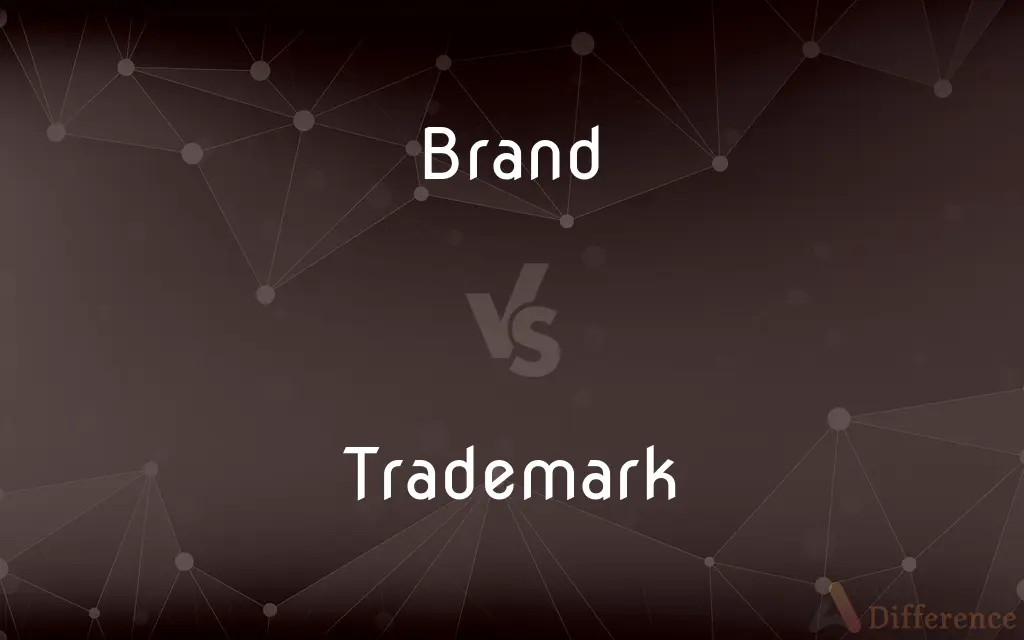Brand vs. Trademark — What's the Difference?
Brand refers to a name, term, design, symbol, or feature distinguishing one’s products, while a trademark legally protects those distinguishing features from imitation.

Difference Between Brand and Trademark
Table of Contents
ADVERTISEMENT
Key Differences
Brand and trademark play pivotal roles in defining and protecting a company's identity and products. A brand encompasses a company's name, logo, design, and other elements that differentiate it from others, creating a unique identity. It is integral for building a reputation, conveying values, and gaining consumer trust and loyalty. A brand represents how a company is perceived by the public and influences consumer behavior and decisions.
Conversely, a trademark is a legally registered symbol, word, or phrase, used to protect the brand's distinguishing features. Trademarks ensure that no other entity can use similar symbols or words that might confuse consumers. They provide legal recourse against unauthorized use or infringement, maintaining the brand's uniqueness and preventing dilution or misuse of its identity.
While brand is about building and maintaining a distinctive presence in the market, a trademark is about legally safeguarding the elements that constitute that presence. Brands utilize elements like logos, taglines, and names to create a memorable and recognizable image in the consumer's mind, establishing a connection and emotional resonance with the audience.
Trademarks, on the other hand, operate within the legal realm, providing the tools and means to protect those elements from unauthorized use or imitation. They secure the brand's integrity and value, ensuring that the time, effort, and resources invested in building a brand are not undermined by counterfeit or infringement.
In essence, brand is the embodiment of a company’s identity, values, and promises made to the consumer, and it exists in the minds of the consumers, while a trademark is a legal mechanism that exists to protect the uniqueness and integrity of the brand from being compromised or diluted by others.
ADVERTISEMENT
Comparison Chart
Definition
Represents a company's identity and values.
A legal protection for brand elements.
Purpose
To differentiate and establish a unique market presence.
To legally protect brand elements from unauthorized use.
Scope
Encompasses name, logo, design, and other distinctive elements.
Specifically protects logos, names, and other brand symbols.
Value
Built through consumer trust and recognition.
Provides legal value and protection to the brand.
Legality
Not legally protected unless trademarked.
Offers legal recourse against infringement.
Compare with Definitions
Brand
The perceived image and emotional response associated with a company.
The brand was renowned for its commitment to sustainability and ethical practices.
Trademark
Legally enforceable, ensuring exclusive rights to use specific brand elements.
The trademark granted them exclusive rights to use the distinctive name.
Brand
A brand is a name, term, design, symbol or any other feature that identifies one seller's good or service as distinct from those of other sellers. Brands are used in business, marketing, and advertising for recognition and, importantly, to create and store value as brand equity for the object identified, to the benefit of the brand's customers, its owners and shareholders.
Trademark
A legally registered symbol or word representing a company or product.
They secured a trademark for their logo to prevent unauthorized use.
Brand
A type of product manufactured by a particular company under a particular name
A new brand of soap powder
Trademark
Provides legal protection against infringement of brand elements.
Having a trademark ensured that their unique design could not be copied.
Brand
An identifying mark burned on livestock or (especially in former times) criminals or slaves with a branding iron
The brand on a sheep identifies it as mine
Trademark
A crucial legal asset for protecting a brand’s integrity and value.
The trademark was vital for maintaining the brand’s reputation and market presence.
Brand
A piece of burning or smouldering wood
He took two burning brands from the fire
Trademark
A trademark (also written trade mark or trade-mark) is a type of intellectual property consisting of a recognizable sign, design, or expression which identifies products or services of a particular source from those of others, although trademarks used to identify services are usually called service marks. The trademark owner can be an individual, business organization, or any legal entity.
Brand
A sword.
Trademark
A symbol, word, or words legally registered or established by use as representing a company or product.
Brand
Mark with a branding iron
The seller had branded the animal with his grandfather's name
Regulations concerning the branding, movement, and sale of cattle
Trademark
Provide with a trademark
They are counterfeiting trademarked goods
Brand
Assign a brand name to.
Trademark
Abbr. TM A name, symbol, or other device used to identify and promote a product or service, especially an officially registered name or symbol that is thereby protected against use by others.
Brand
A trademark or distinctive name identifying a product, service, or organization.
Trademark
A distinctive characteristic by which a person or thing comes to be known
The snicker that became the comedian's trademark.
Brand
A product or service so identified
Bought a popular brand of soap.
Trademark
To label (a product) with proprietary identification.
Brand
An association of positive qualities with a widely recognized name, as of a product line or celebrity
The company tried to improve its brand by donating money to charity.
Trademark
To register (something) as a trademark.
Brand
A distinctive category; a particular kind
A brand of comedy that I do not care for.
Trademark
A word, symbol, or phrase used to identify a particular company's product and differentiate it from other companies' products.
Brand
A mark indicating identity or ownership, burned on the hide of an animal with a hot iron.
Trademark
Any proprietary business, product or service name.
Brand
A mark burned into a person's flesh, as to identify a convicted criminal or a slave.
Trademark
The aspect for which someone or something is best known; a hallmark or typical characteristic.
Brand
A mark burned into a person's flesh for ornamental or aesthetic purposes.
Trademark
(proscribed) To register something as a trademark.
Brand
An association of disgrace or notoriety with something; a stigma.
Trademark
(proscribed) To so label a product.
Brand
A branding iron.
Trademark
(informal) Distinctive, characteristic, signature.
Brand
A piece of burning or charred wood.
Trademark
A distinctive characteristic or attribute
Brand
(Archaic) A sword
“So flashed and fell the brand Excalibur” (Tennyson).
Trademark
A formally registered symbol identifying the manufacturer or distributor of a product
Brand
To mark with a hot iron, as to show ownership
Branded the steer.
Trademark
A distinctive sign capable of distinguishing the goods or services of one enterprise from those of other enterprises.
Their trademark distinguished them from competitors, representing reliability and quality.
Brand
To provide with or publicize using a brand name or other readily recognized identifier
A line of cars branded with mythological names.
Brand
To consider or label as disgraceful or infamous; stigmatize
Branded the deserters as cowards.
Brand
To impress firmly; fix ineradicably
Imagery of the war has branded itself into the national consciousness.
Brand
A conflagration; a flame.
Brand
A piece of burning wood or peat, or a glowing cinder.
To burn something to brands and ashes.
Brand
A torch used for signaling.
Brand
(archaic) A sword.
Brand
A mark or scar made by burning with a hot iron, especially to mark cattle or to classify the contents of a cask.
Brand
A branding iron.
Brand
The symbolic identity, represented by a name and/or a logo, which indicates a certain product or service to the public.
Brand
A specific product, service, or provider so distinguished.
Some brands of breakfast cereal contain a lot of sugar.
Brand
(by extension) Any specific type or variety of something; a distinct style or manner.
I didn’t appreciate his particular brand of flattery.
New Orleans brand sausage; Danish brand ham
Brand
The public image or reputation and recognized, typical style of an individual or group.
Brand
A mark of infamy; stigma.
Brand
Any minute fungus producing a burnt appearance in plants.
Brand
(transitive) To burn the flesh with a hot iron, either as a marker (for criminals, slaves etc.) or to cauterise a wound.
When they caught him, he was branded and then locked up.
Brand
(transitive) To mark (especially cattle) with a brand as proof of ownership.
The ranch hands had to brand every new calf by lunchtime.
Brand
(transitive) To make an indelible impression on the memory or senses.
Her face is branded upon my memory.
Brand
(transitive) To stigmatize, label (someone).
He was branded a fool by everyone that heard his story.
Brand
To associate a product or service with a trademark or other name and related images.
They branded the new detergent "Suds-O", with a nature scene inside a green O on the muted-colored recycled-cardboard box.
Brand
A burning piece of wood; or a stick or piece of wood partly burnt, whether burning or after the fire is extinct.
Snatching a live brand from a wigwam, Mason threw it on a matted roof.
Brand
A sword, so called from its glittering or flashing brightness.
Paradise, so late their happy seat,Waved over by that flaming brand.
Brand
A mark made by burning with a hot iron, as upon a cask, to designate the quality, manufacturer, etc., of the contents, or upon an animal, to designate ownership; - also, a mark for a similar purpose made in any other way, as with a stencil. Hence, figurately: Quality; kind; grade; as, a good brand of flour.
Brand
A mark put upon criminals with a hot iron. Hence: Any mark of infamy or vice; a stigma.
The brand of private vice.
Brand
An instrument to brand with; a branding iron.
Brand
Any minute fungus which produces a burnt appearance in plants. The brands are of many species and several genera of the order Pucciniæi.
Brand
To burn a distinctive mark into or upon with a hot iron, to indicate quality, ownership, etc., or to mark as infamous (as a convict).
Brand
To put an actual distinctive mark upon in any other way, as with a stencil, to show quality of contents, name of manufacture, etc.
Brand
Fig.: To fix a mark of infamy, or a stigma, upon.
The Inquisition branded its victims with infamy.
There were the enormities, branded and condemned by the first and most natural verdict of common humanity.
Brand
To mark or impress indelibly, as with a hot iron.
As if it were branded on my mind.
Brand
A name given to a product or service
Brand
A recognizable kind;
There's a new brand of hero in the movies now
What make of car is that?
Brand
Identification mark on skin, made by burning
Brand
A piece of wood that has been burned or is burning
Brand
A symbol of disgrace or infamy;
And the Lord set a mark upon Cain
Brand
A cutting or thrusting weapon with a long blade
Brand
Burn with a branding iron to indicate ownership; of animals
Brand
To accuse or condemn or openly or formally or brand as disgraceful;
He denounced the government action
She was stigmatized by society because she had a child out of wedlock
Brand
Mark or expose as infamous;
She was branded a loose woman
Brand
A unique design, symbol, or name associated with a company or product.
The brand’s logo was instantly recognizable, symbolizing quality and reliability.
Brand
A distinct identity that differentiates a business from others in the market.
A strong brand is crucial for standing out in a competitive market.
Brand
Represents the values, personality, and reputation of a company.
The brand was synonymous with innovation and customer satisfaction.
Brand
The collective impression and experience of consumers regarding a company or product.
The brand enjoyed a loyal customer base due to its consistent high quality.
Common Curiosities
Does a trademark protect brand reputation?
Indirectly, by preventing unauthorized use or imitation of brand elements, it helps in maintaining brand reputation.
Can multiple companies have similar trademarks?
No, trademarks are meant to avoid consumer confusion by preventing similar marks in related goods or services.
Does having a strong brand guarantee trademark approval?
No, trademark approval depends on distinctiveness, the likelihood of confusion, and other legal criteria, not brand strength.
Is building a brand solely about creating a logo?
No, building a brand involves developing a unique identity, values, and consistent consumer experience, not just a logo.
Can a brand exist without a trademark?
Yes, a brand can exist without a trademark, but it won't have legal protection against infringement.
How does trademark infringement affect a brand?
It can dilute brand value, cause loss of consumer trust, and lead to financial losses.
Can a brand be changed after trademark registration?
Yes, but changes may require new trademark applications and may impact brand recognition and equity.
Is every brand element eligible for a trademark?
Not necessarily; only distinctive elements that can uniquely identify the source of goods or services can be trademarked.
Does a brand’s value increase with trademark protection?
Yes, a trademark protects and adds value to a brand by ensuring exclusivity and legal recourse against infringement.
Can trademarks expire?
Yes, if not renewed or properly maintained, trademarks can expire or be cancelled.
Can a trademark protect a brand internationally?
Trademarks are territorial, but international treaties and agreements can facilitate international protection.
How does a strong brand benefit a company?
A strong brand fosters consumer loyalty, allows premium pricing, and provides a competitive advantage.
Can anyone apply for a trademark?
Yes, individuals, businesses, and legal entities can apply for trademarks, provided they meet the criteria.
Is it necessary to register a brand as a trademark?
While not mandatory, registering provides legal protection and exclusive rights to the brand elements.
Is brand only about visual elements?
No, a brand encompasses visual elements, values, perceptions, and the overall consumer experience with a company or product.
Share Your Discovery

Previous Comparison
Aggradation vs. Degradation
Next Comparison
Tramp vs. Homeless















































